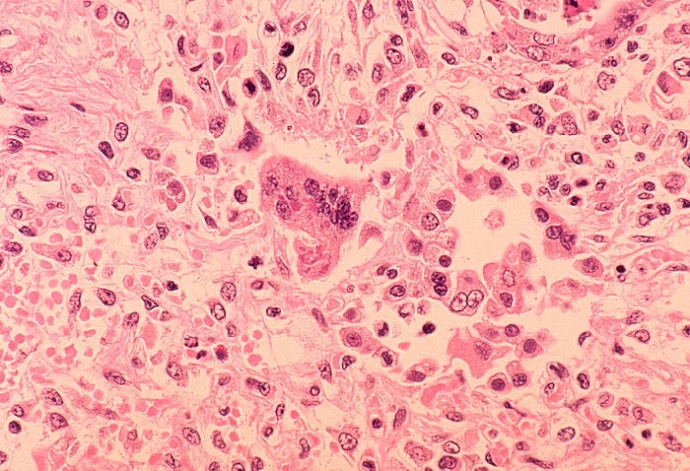Health Dept. Investigating Measles Report on Maui, No “Confirmed” Cases in 2015

Histopathology of measles pneumonia.
Giant cell with intracytoplasmic inclusions. CDC image / Dr. Edwin P. Ewing, Jr.
By Wendy Osher
Health officials are investigating a possible new measles case on Maui, but say there are no “confirmed” cases so far for 2015.
Ronald Balajadia, Immunization Branch Chief for the Department of Health tells Maui Now that the report is currently under investigation.
Maui Now was informed by unnamed sources that the report was made at the Kaiser Maui Lani Clinic in Wailuku.
“I cannot confirm additional case of measles. Even if I had heard of it, we don’t talk about our patients due to privacy laws,” said Laura Lott, director of community and public relations at Kaiser Permanente Hawaiʻi. “While I cannot share information about specific patients, the CDC website has great information on the MMR vaccine,” she said.
In November, the clinic had set up a special mobile measles treatment area outside of the Maui Lani facility. The temporary tent has since been taken down.
According to Balajadia, health officials reported a total of 13 cases in Hawaiʻi: seven on Kauaʻi, four on Maui, and two on Oʻahu. The October cases, combined with the two reports confirmed in February of 2014, bring the total cases in Hawaiʻi to 15.
Symptoms:
The state Department of Health says the symptoms of measles generally begin about 14 days (range 7 to 21 days) after a person is infected and may include the following: blotchy red rash; fever; cough; runny nose; red, watery eyes (conjunctivitis); and feeling run down, achy (malaise).
Another characteristic symptom is Koplik’s spots, which are not always present, but appear as tiny white spots with bluish-white centers found inside the mouth.
Vaccine:
In earlier reports, state health officials said measles is so contagious that it will infect 90% of the contacts who are not immune. The best way to prevent measles, health officials advise, is to get vaccinated.
The CDC website states that, “A vaccine, like any medicine, is capable of causing serious problems, such as severe allergic reactions. The risk of MMR vaccine causing serious harm, or death, is extremely small. Getting MMR vaccine is much safer than getting measles, mumps or rubella. Most people who get MMR vaccine do not have any serious problems with it.”
Balajadia said, “The vaccine is very safe.” He continued saying, “We know that measles is out there; we know it can cause severe disease. We want to make sure people travelling are vaccinated, and that parents make sure their children are vaccinated.”







